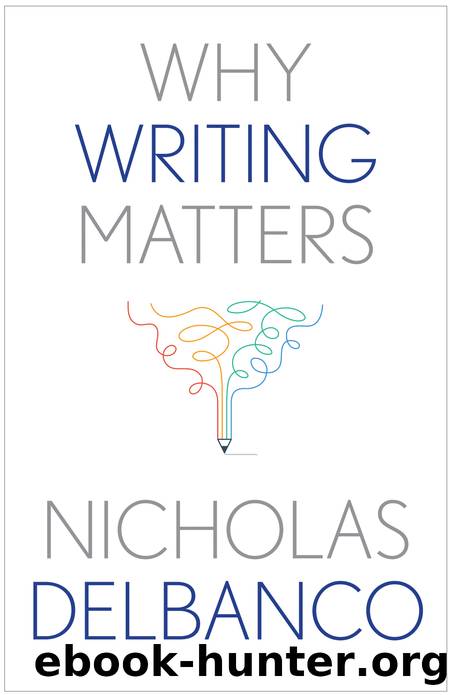Why Writing Matters by Nicholas DelBanco

Author:Nicholas DelBanco
Language: eng
Format: epub
ISBN: 9780300243048
Publisher: Yale University Press
One additional entry. At the University of Michigan, in 2004, a student enrolled in the MFA program for which I served as director. She came from the deep South and was ill at ease. Arriving, she told me in private, she felt homesick for Mississippi and her family in DeLisle. Further, the young woman suffered from migraines and was horrified by snow. She seemed hesitant to speak in class, unhappy and alone. Her debut was inauspicious, her first set of exercises arguedâor so I fearedâa tin ear. I worried sheâd not stay the course, either literally or metaphorically, and told her to take all the time she required in order to write the assignments and not to join the discussions until she had something to say.
This went on for some time. Her imitations of Hemingway, Ford, and Woolf were, to put it bluntly, second-rate. The echoes were muffled, the rhetoric inexact. But then we came to William Faulkner, and the student got it; it was almost as though Faulkner too attended class and she were channeling him. Her language had been static; it now grew electric, and everyone in the seminar room shared my opinion and praise. The landscape, the descriptive prose, the dialogue, the characters all echoed the great original, but in an original mode. From that moment on the student was a full and eager member of our group; her talent fairly blazed. In all my years of teaching I have not, before or since, seen such a transformation; by borrowing the syntax and inflections of a dead southern master, the writer found her voice.
That voice belongs to Jesmyn Ward. Her first novel, Where the Line Bleeds (2008), begins with a passage she produced for âStrategies in Prose,â and by now Ms. Wardâs own language has been much copied and honored. She has received the MacArthur (âGeniusâ) Award and the Mildred and Harold Strauss Livings Award from the American Academy. Her 2011 novel, Salvage the Bones, won the National Book Award for Fiction. Her memoir, Men We Reaped (2013), about the deaths of her brother and four other young men, demonstrates full authorial assurance. In The Fire This Time (2016), she contributed an essay to and edited a collection of tributes to James Baldwin, referencing his classic The Fire Next Time (1963). Her most recent novel, Sing, Unburied, Sing (2017), was published to widespread acclaim and, for the second timeâthe only time such an honor has been twice accorded to a womanâwon the National Book Award in Fiction. Though there are echoes, still, of Faulkner, hers has become a style absorbed and voiced in a new key. If only in this one careerâbut there are many, many moreâI feel the value of close study of the work of other authors has been amply shown.
Download
This site does not store any files on its server. We only index and link to content provided by other sites. Please contact the content providers to delete copyright contents if any and email us, we'll remove relevant links or contents immediately.
| Booksellers & Bookselling | General |
| History of Books |
4 3 2 1: A Novel by Paul Auster(12393)
The handmaid's tale by Margaret Atwood(7766)
Giovanni's Room by James Baldwin(7346)
Asking the Right Questions: A Guide to Critical Thinking by M. Neil Browne & Stuart M. Keeley(5775)
Big Magic: Creative Living Beyond Fear by Elizabeth Gilbert(5774)
Ego Is the Enemy by Ryan Holiday(5450)
The Body: A Guide for Occupants by Bill Bryson(5097)
On Writing A Memoir of the Craft by Stephen King(4944)
Ken Follett - World without end by Ken Follett(4734)
Adulting by Kelly Williams Brown(4574)
Bluets by Maggie Nelson(4559)
Eat That Frog! by Brian Tracy(4540)
Guilty Pleasures by Laurell K Hamilton(4449)
The Poetry of Pablo Neruda by Pablo Neruda(4109)
Alive: The Story of the Andes Survivors by Piers Paul Read(4033)
White Noise - A Novel by Don DeLillo(4011)
Fingerprints of the Gods by Graham Hancock(4004)
The Book of Joy by Dalai Lama(3986)
The Bookshop by Penelope Fitzgerald(3854)
